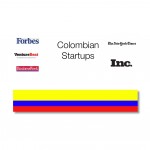 As I mentioned in the last post, I intend to return to posting in my blog as often as possible. Also, I really like the fact that Conrad Egusa showed interest in posting in my blog and will look for more contributors. Finally, I’ve asked my favorite designer, Sergio Martinez, to help me out in redesigning the TropicalGringo site so any suggestions are more than welcome!
As I mentioned in the last post, I intend to return to posting in my blog as often as possible. Also, I really like the fact that Conrad Egusa showed interest in posting in my blog and will look for more contributors. Finally, I’ve asked my favorite designer, Sergio Martinez, to help me out in redesigning the TropicalGringo site so any suggestions are more than welcome!
Now that I have those comments out of the way, I do have some pretty big news to announce. My company (Lima Interactive, Ltda) and a company called Social Atom Group cofounded by Andres Barreto (he sits on the board) have joined forces and have created a new incubator called Social Atom Ventures. Note: In case the previous link doesn’t drive you to the official website yet, try again in a few days as we are building the website as we speak.
If you’ve read my blog previously, you know that I mentor quite a bit for organizations such as the Founder Institute, Wayra and Endeavor, among others. Though I’ve launched my own startup called SuperTrendi several months ago, I am quite comfortable looking at startups from the perspective of an investor not only from my experience working for Intel Capital, but also due to my role as board member of three Colombian startups.
For some crazy reason, I really get a kick out of mentoring startups. Aside from officially mentoring startups, I do a lot of coffee mentoring (over a cup of coffee or with my favorite breakfast – French Toast). One of the most rewarding of these experiences was a startup a few years ago that was about to commence fund raising in the states and I did several sessions playing the role of a “not too nice” investor. A lot of times when I would stump the CEO of this startup, it was usually either an area that he didn’t realize that was particularly weak or something about his strategy for which he hadn’t crafted the messaging or both. Needless to say, he was successful in raising several rounds of millions of dollars.
Like I said, for some crazy reason, I really get a kick out of all this. That doesn’t mean it’s easy. It’s not. One of the hardest gigs has been as Director for the Founder Institute, which is a global, pre-idea accelerator created by Adeo Ressi and running in over 30 cities around the world. There’s nothing tougher than meeting with founder after founder each with a list of about three vague ideas for a possible startup and trying to guide them (without providing the answers) on a path that will make sense and be aligned with something they’re passionate about.
Social Atom Ventures is one of three “consolidation” incubators that will be supported by the Colombian government. Also, we’ll be operating out of some pretty nice office space and will be expecting the selected startups to work full-time on their startups from this space. As Program Director, I’ll be offering guidance to the teams in addition to a network of local and international mentors. Each of these teams needs to have a tecnical co-founder and be adept at “building stuff.” Thanks to an alliance with Argentinean incubator NXTP Labs, we’ll also be investing US $25k in at least five teams and up to a possible 10 teams.
The closest I’ve seen to something like this is in Colombia Telefonica’s Wayra initiative of which I am certainly a fan. Nonetheless, although there may be a little bit of overlap, it goes without saying that a multibillion dollar such as Telefonica and a relatively small organization such as others will have emphasize different strengths and this is all good for the startup ecosystem in Colombia. As i’ve written previously, when compared to Argentina and Brazil and even Chile and Mexico, Colombia has a long way to go in terms of generating the amount and quality of scalable and fundable startups (not that these are the only kind of startups that can be deemed successful).
It’s hard to tell, but it does seem like the right time for Social Atom Ventures. When I first brought the Founder Institute to Colombia in 2012, I watched as several of the 9 graduating founders were somewhat star-struck. One of these managed to really tick me off when he said that we should have had more than the 4 mentors that travelled from the states when I felt that these 4 were more than enough because of the calibre of mentors we had locally. I value these just as highly since they understand the potential of global markets, but understand the realities of the local environment. This year, I saw a lot less of this and much more acknowledgement that there are great mentors living right here in Colombia.
Either way, in addition to the local mentoring, we’ll be flying the teams to the US at least once and, if possible, more than this as we have high expectations for the teams we’ll be funding and mentoring. I know there are talented Colombian founders, but I’d also like to see founders from other countries (US, Brazil, Mexico, etc.) apply. If you are interested in applying, you’ll be able to fill out our application form in a few days a soon as the Social Atom Ventures site is live. We are looking for teams of founders with at least one technical cofounder and ready to build product and discover and solve real customer pains that produce exciting, scalable businesses.
 The other day I wrote a post about thinking bigger and now see that the concept has applicability to countries as well as startups. I took a day trip to Medellin yesterday to talk, along with my friend Conrad Egusa, with the management team of a multibillion dollar corporation with almost 200,000 employees. They are taking a serious look at Colombia and, particularly, Medellin. It really made me think about something that I’ve stated verbally but don’t think I’ve written here. That we are living during a moment in history when a number of things are shifting (e.g., economic power, penetration of digital tools, etc.). Many countries (particularly, in emerging markets) such as Colombia can either decide that the future will be much different than the past and start making decisions commensurate with the opportunity before them or squander their window of opportunity and forfeit a much brighter future to emerging market countries who have more insight into this new global context.
The other day I wrote a post about thinking bigger and now see that the concept has applicability to countries as well as startups. I took a day trip to Medellin yesterday to talk, along with my friend Conrad Egusa, with the management team of a multibillion dollar corporation with almost 200,000 employees. They are taking a serious look at Colombia and, particularly, Medellin. It really made me think about something that I’ve stated verbally but don’t think I’ve written here. That we are living during a moment in history when a number of things are shifting (e.g., economic power, penetration of digital tools, etc.). Many countries (particularly, in emerging markets) such as Colombia can either decide that the future will be much different than the past and start making decisions commensurate with the opportunity before them or squander their window of opportunity and forfeit a much brighter future to emerging market countries who have more insight into this new global context.

 These are: 1. The fact that, before graduating from college, he had already cofounded a site with more than 350k registered users and 2. His global vision and ability to see opportunities not only in the US, but, also, in countries outside of the US.
These are: 1. The fact that, before graduating from college, he had already cofounded a site with more than 350k registered users and 2. His global vision and ability to see opportunities not only in the US, but, also, in countries outside of the US.
